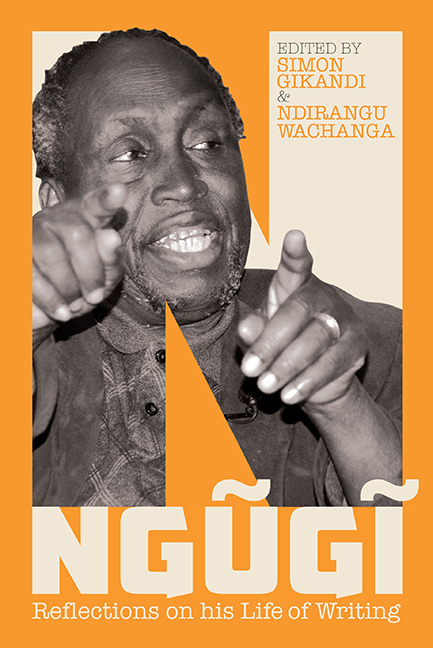Book contents
- Frontmatter
- Contents
- Preface
- Acknowledgements
- Chronology
- Photographic Section
- Introduction: Ngũgĩ wa Thiong'o: Reflections on His Life of Writing
- Ngũgĩ at Work
- Part I Serenades & Beginnings
- Part II Memories, Recollections & Tributes
- Part III Working with Ngũgĩ
- Part IV The Writer, the Critic & the World
- Part V The Other Ngũgĩ
- Appendixes
- References
- Bibliography of Ngũgĩ's Primary Works
- Works Cited
- Notes on Contributors
- Index
Ngũgĩ at Work
Published online by Cambridge University Press: 27 July 2019
- Frontmatter
- Contents
- Preface
- Acknowledgements
- Chronology
- Photographic Section
- Introduction: Ngũgĩ wa Thiong'o: Reflections on His Life of Writing
- Ngũgĩ at Work
- Part I Serenades & Beginnings
- Part II Memories, Recollections & Tributes
- Part III Working with Ngũgĩ
- Part IV The Writer, the Critic & the World
- Part V The Other Ngũgĩ
- Appendixes
- References
- Bibliography of Ngũgĩ's Primary Works
- Works Cited
- Notes on Contributors
- Index
Summary
In 2010, Ngũgĩ wa Thiong'o authorized me to document his life and work in form of a documentary film. Looking at his life and his intellectual biography provides a window into an understanding of the major debates on African languages and literatures, the role of writers and intellectuals in political, social, and cultural transformation, on colonialism and decolonization, on the pain and melancholy of exile, diasporic privileges and displacements, and on the memory of the colonized. It is instructive that Ngũgĩ turned 80 when his country, Kenya, was celebrating 55 years of political independence. The coincidence is insightful because Ngũgĩ's biography and intellectual career are emblematic of Kenya's complex process of becoming a nation, its political and cultural challenges, as well as its intellectual history. His biography provides revealing insights about the deployment of memory, and the role of memory in the evolution of the African nation states, allowing us to evaluate the relationship between the state and the African memory project. If the process of becoming of most African nation states continues to been defined by an unofficial program of forgetting, Ngũgĩ's biography invites the public to resist the urge to forget—rather to re-member.
This documentary project is motivated by a belief that the preservation of memories and experiences through visual and audio technology has a number of advantages over written materials: it enables representation and subsequent preservation of raw voices. While the objective is to produce a feature film documentary on Ngũgĩ, all the footage captured during the production process will be thematically archived in an open access repository. For more than half a century, he has been an eloquent voice championing human rights and a leader in global cultural criticism and political activism. Because of his longevity, Ngũgĩ's life and writings connect readers to an East African history that they only read in history books. In the following discussion, I organize my reflection on Ngũgĩ's life and his works around four distinct stages.
Phase I—Growing Up (1938–1959)
Born on January 5, 1938, Ngũgĩ grew up during the most violent period in Kenya's history, and came of age at the end of British occupation in East Africa.
- Type
- Chapter
- Information
- NgugiReflections on his Life of Writing, pp. 13 - 22Publisher: Boydell & BrewerPrint publication year: 2018



